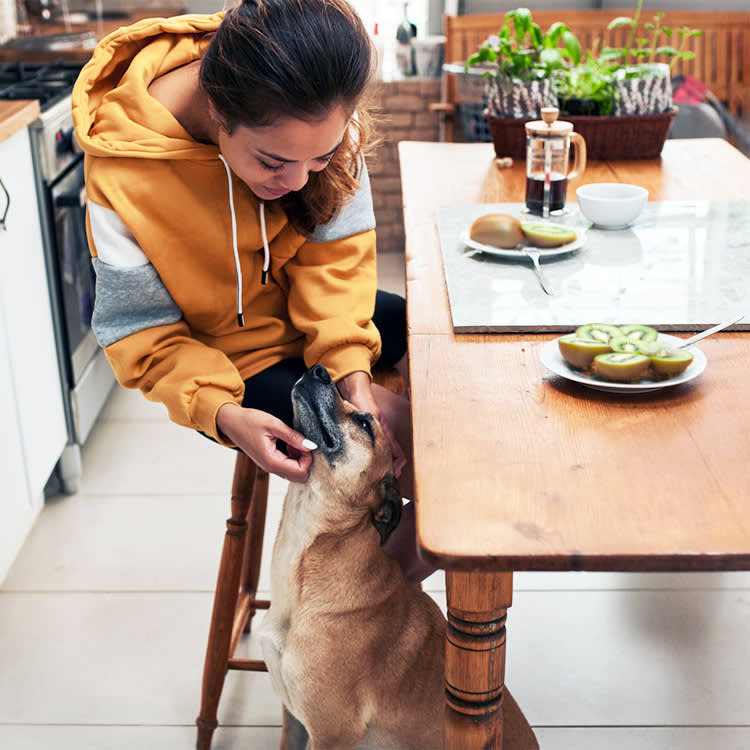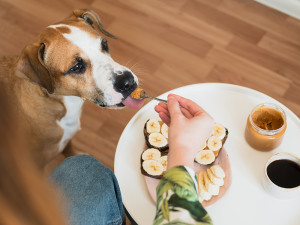Can My Dog Eat Kiwi?
Your dog can snack on this fibre-fuelled fruit but don't go all out...
Originally from China (not New Zealand) and previously known as ‘Chinese Gooseberries’, kiwi fruit is a crowd favourite.
Available year-round and bursting with nutrients, kiwi contains more vitamin C than oranges and is packed with dietary fibre, potassium and antioxidants. It’s also one of the least pesticide-contaminated fruits – it really is an all-rounder.
From its tangy-sweet flesh to its fuzzy camel-coloured skin, every part of the kiwi is edible and contains countless health benefits.
But, ever wondered if your dog can enjoy the nutrients this juicy fruit has to offer? The good news is yes, dogs can have peeled, diced kiwi in moderation.
Kiwis: nutrition facts for dogs
For humans, kiwi is considered a food packed with nutrients. It’s usually best known for being high in fibre and its water content, ingredients we tend to look for in a quick constipation remedy.
It’s pretty much the same for dogs – kiwis are high in fibre, vitamin C and potassium, which are all key nutrients in a dog’s diet. However, this also means that too much kiwi could cause stomach upset or diarrhoea so it's best to stick to small portions.
Are kiwis good for dogs?
Kiwis are not toxic for dogs and can provide a nutritious dose of fibre, vitamin C and potassium when given in moderation. However, due to their high sugar content, excessive consumption of kiwi could do more harm than good.
“If your dog is struggling with constipation, for example, a slice of peeled kiwi could benefit them,” says Dr Kate McCrossan, a veterinary surgeon practising in Northern Ireland. “Having said this, kiwi may also have the opposite effect on your dog and lead to diarrhoea, or stomach upset, especially if your dog has a sensitive tummy.”
Dogs should already be receiving enough key nutrients from their regular diet so they don’t need such fruits in their diet. But, a slice of kiwi is a good option for a healthy treat!
How to feed kiwis to dogs
Of course, don’t jump in and feed your dog an entire kiwi for dinner or replace their meal with a bowl of fruit – this could be a messy disaster.
Try feeding your dog one small bite in the first instance and monitor for any diarrhoea or stomach upset.
“Like all fruit, if you want to give your dog kiwi, include it as part of their daily treat intake, says Dr Kate. “Peel the skin and give them a small bite-sized chunk of the green part of the kiwi.”
Can dogs eat kiwi skin?
“While kiwi skin is not toxic for dogs, it can be difficult to digest,” says Dr Kate. “The skin may cause gas or digestive discomfort so it’s always best to peel the kiwi and cut it into small pieces.”
Can dogs eat the kiwi seeds?
“The seeds found in kiwi are typically safe for your dog to eat,” says Dr Kate, “they are small in size, posing no choking hazard and are not toxic.”
Thankfully, you can simply feed the slice of kiwi to your dog without worrying about removing the tiny seeds.
The bottom line: can dogs eat human food?
There are many safe human foods that dogs can enjoy. Like any new food, it’s best to chat to your vet about any concerns before trying them, especially if your dog has a sensitive stomach.
Any human food given is added as a treat, not as part of their balanced diet so it should not be served as their main meal. If you are wary of giving your dog human food, it’s best to leave it. Your dog should be receiving all nutrients from a complete and balanced dog food and you can offer them some tasty dog treats as a bonus.
What are some other fruits that are safe for dogs?
Pears: if fed in moderation, it is safe for dogs to eat small pieces of pear without the core or seeds. Pears are high in vitamin C and K as well as fibre so can be a juicy treat for your dog.
Blueberries: mostly blueberries are good for dogs. They’re low in calories and contain antioxidants and vitamins C and K but due to the high fibre content, it’s best to feed in moderation as things could get messy!
Watermelon: watermelon is made up of mostly water and can be a refreshing treat for your dog. However, it’s essential to remove the seeds as they could cause severe blockages.
Fruits that are not safe for dogs
Grapes: grapes can cause acute kidney failure in dogs. The toxic ingredient, tartaric acid, is present in variable amounts in every grape. Even if your dog eats one grape, you should check in with the vet to make sure everything is okay.
Cherries: avoid giving your dog cherries as the pit and stems can cause intestinal blockage. The pit is also extremely toxic to dogs.
Avocado: while small amounts of avocado flesh are generally considered safe for dogs, larger quantities are riskier due to the presence of persin. Just to be safe, it’s best not to give your dog the green fruit.
Frequently asked questions
What happens if my dog eats a kiwi?
Kiwis are safe for dogs but should be fed peeled and in small amounts.
Can dogs eat kiwi skins?
Kiwi skins aren’t toxic for dogs but can be hard to digest so it’s best to peel the kiwi.
Can I feed my dog kiwi seeds?
Kiwi seeds are small enough not to be a choking hazard and safe for your dog to ingest.








